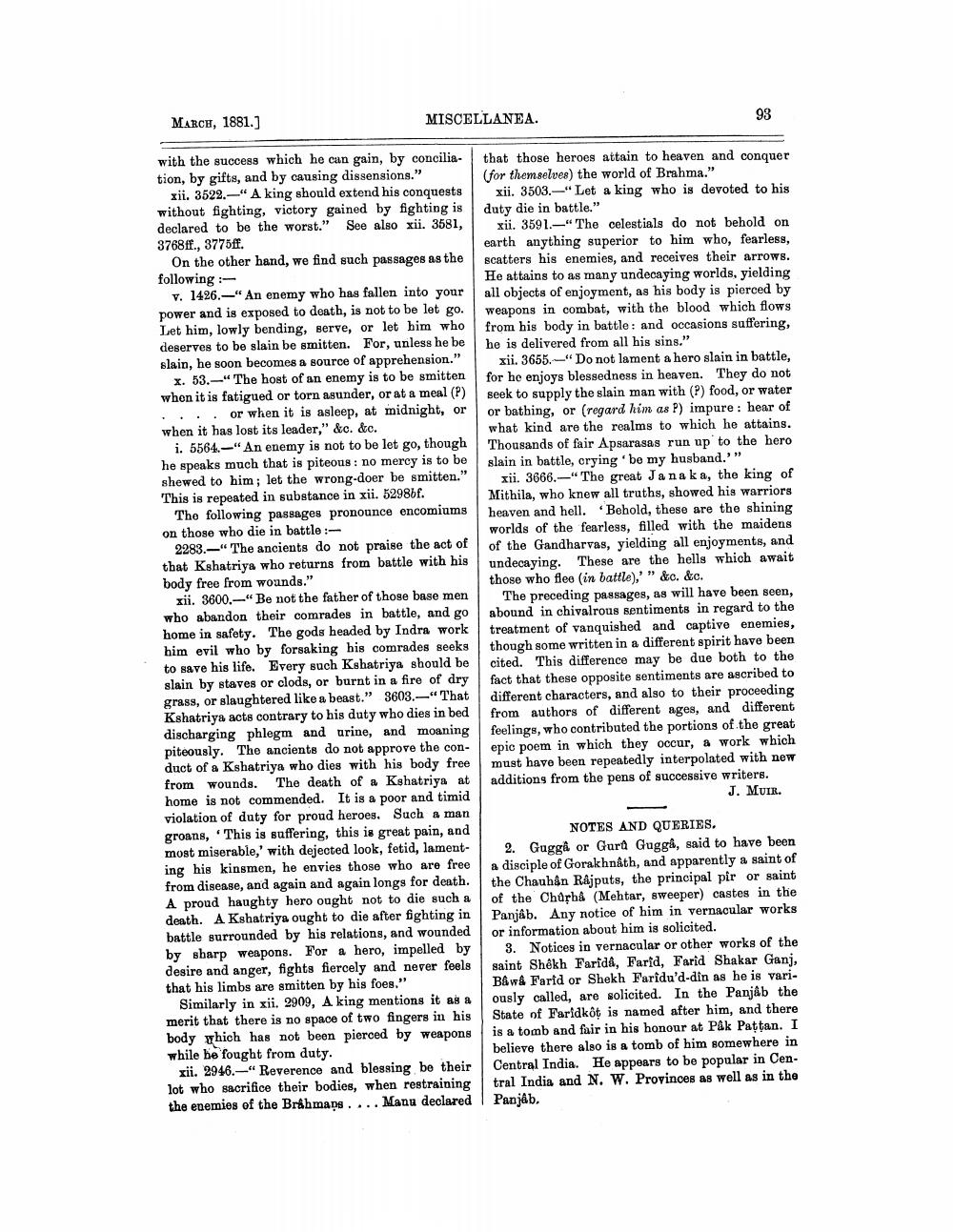________________
MARCE, 1881.]
MISCELLANEA.
93
with the success which he can gain, by concilia- that those heroes attain to heaven and conquer tion, by gifts, and by causing dissensions."
(for themselves) the world of Brahma." xii. 3522.- A king should extend his conquests xii. 3503.-"Let a king who is devoted to his without fighting, victory gained by fighting is duty die in battle." declared to be the worst." See also xii. 3581, xii. 3591.-" The celestials do not behold on 3768ff., 3775ff.
earth anything superior to him who, fearless, On the other hand, we find such passages as the scatters his enemies, and receives their arrows. following: -
He attains to as many undecaying worlds, yielding v. 1426.-"An enemy who has fallen into your all objects of enjoyment, as his body is pierced by power and is exposed to death, is not to be let go. weapons in combat, with the blood which flows Let him, lowly bending, serve, or let him who from his body in battle: and occasions suffering, deserves to be slain be smitten. For, unless he be he is delivered from all his sins." slain, he soon becomes a source of apprehension." xii. 3655."Do not lament a hero slain in battle,
X. 53.-" The host of an enemy is to be smitten for he enjoys blessedness in heaven. They do not when it is fatigued or torn asunder, or at a meal (P)
seek to supply the slain man with (?) food, or water . .. or when it is asleep, at midnight, or or bathing, or (regard him as P) impure: hear of when it has lost its leader," &c. &c.
what kind are the realms to which he attains. i. 5564.-"An enemy is not to be let go, though
Thousands of fair Apsarasas run up to the hero he speaks much that is piteous: no mercy is to be slain in battle, crying be my husband.'” shewed to him; let the wrong-doer be smitten." xii. 3666.-" The great Janaka, the king of This is repeated in substance in xii. 5298bf.
Mithila, who knew all truths, showed his warriors The following passages pronounce encomiums heaven and hell. Behold, these are the shining on those who die in battle :
worlds of the fearless, filled with the maidens 2283.-" The ancients do not praise the act of of the Gandharvas, yielding all enjoyments, and that Kshatriya who returns from battle with his undecaying. These are the hells which await body free from wounds."
those who flee (in battle),'" &c. &c. xii. 3600.-"Be not the father of those base men The preceding passages, as will have been seen, who abandon their comrades in battle, and go | abound in chivalrous sentiments in regard to the home in safety. The gods headed by Indra work treatment of vanquished and captive enemies, him evil who by forsaking his comrades seeks though some written in a different spirit have been to save his life. Every such Kshatriya should be cited. This difference may be due both to the slain by staves or clods, or burnt in a fire of dry fact that these opposite sentiments are ascribed to grass, or slaughtered like a beast." 3603.-" That different characters, and also to their proceeding Kshatriya acts contrary to his duty who dies in bed from authors of different ages, and different discharging phlegm and urine, and moaning feelings, who contributed the portions of the great piteously. The ancients do not approve the con- epic poem in which they occur, a work which duct of a Kshatriya who dies with his body free must have been repeatedly interpolated with new from wounds. The death of a Kshatriya at additions from the pens of successive writers. home is not commended. It is a poor and timid
J. MUIR. violation of duty for proud heroes. Such a man groans, This is suffering, this is great pain, and
NOTES AND QUERIES. most miserable,' with dejected look, fetid, lament- 2. Gugga or Gurd Gugga, said to have been ing his kinsmen, he envies those who are free a disciple of Gorakhnath, and apparently a saint of from disease, and again and again longs for death. the Chauhan Rajputs, the principal për or saint A proud haughty hero ought not to die such a of the Chupha (Mehtar, sweeper) castes in the death. A Kshatriya ought to die after fighting in Panjab. Any notice of him in vernacular works battle surrounded by his relations, and wounded or information about him is solicited. by sharp weapons. For a hero, impelled by 3. Notices in vernacular or other works of the desire and anger, fights fiercely and never feels saint Shêkh Farida, Farid, Farid Shakar Ganj, that his limbs are smitten by his foes."
B&w& Farid or Shekh Faridu'd-din as he is variSimilarly in xii. 2909, A king mentions it as a ously called, are solicited. In the Panjab the merit that there is no space of two fingers in his State of Faridkot is named after him, and there body which has not been pierced by weapons is a tomb and fair in his honour at Pak Pattan. I while be fought from duty.
believe there also is a tomb of him somewhere in xii. 2946.-"Reverence and blessing be their Central India. He appears to be popular in Cen. lot who sacrifice their bodies, when restraining tral India and N. W. Provinces as well as in the the enemies of the Brahmans .... Manu declared | Panjab.




